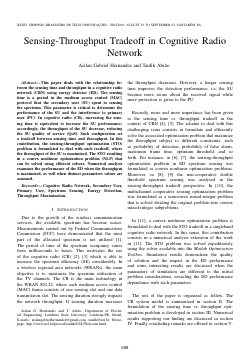
Sensing-Throughput Tradeoff in Cognitive Radio Network
Aislan Gabriel Hernandes, Taufik Abrão
DOI: 10.14209/sbrt.2016.202
Evento: XXXIV Simpósio Brasileiro de Telecomunicações (SBrT2016)
Keywords: Cognitive Radio Network Secondary User Primary User Spectrum Sensing Energy Detection Throughput Maximization
Abstract
This paper deals with the relationship between the sensing time and throughput in a cognitive radio network (CRN) using energy detector (ED). The sensing time is a period in the medium access control (MAC) protocol that the secondary user (SU) spent to sensing the spectrum. This parameter is critical to determine the performance of the SU and the interference to primary user (PU). In cognitive radio (CR), increasing the sensing time is equivalent to increase the SU performance; accordingly, the throughput of the SU decrease, reducing the SU quality of service (QoS). Such configuration set a tradeoff between sensing time and throughput. In this contribution, the sensing-throughput optimization (STO) problem is formulated to deal with such tradeoff, where the throughput of the SU is maximized. The STO resulting in a convex nonlinear optimization problem (NLP) that can be solved using efficient solvers. Numerical analysis examines the performance of the ED when the throughput is maximized, as well when distinct parameters values are assumed.Download